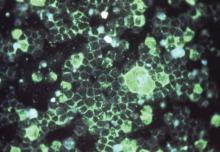A new study will expose adults to respiratory syncytial virus (RSV), so researchers can understand how it develops, with the goal of developing better RSV antivirals and vaccines in the future, according to a National Institutes of Health press release.
While RSV causes cold-like symptoms and is not much of an issue for adults, the disease can cause much more severe symptoms in very young children, in anyone with a weakened immune system, and in the elderly. Around 55,000 children are hospitalized for RSV annually, mostly infants younger than 6 months. In addition, RSV causes about 14,000 deaths per year in people older than 65, according to the NIH.
The study, conducted by the NIH’s National Institute of Allergy and Infectious Diseases, will involve up to 60 adults – men and nonpregnant women – aged 18-50 years. They will be given two droplets containing a laboratory-developed strain of RSV, called RSV A2, commonly used in medical research, and they will be closely monitored for up to 2 weeks in isolation.
“We do not anticipate that the healthy, carefully screened adult volunteers in this study will become severely sick from the RSV challenge virus because, in general, healthy adults are repeatedly exposed to RSV in their lives and either remain asymptomatic or develop a mild to moderate cold,” said Dr. Lesia K. Dropulic of NIAID’s Laboratory of Infectious Diseases.


